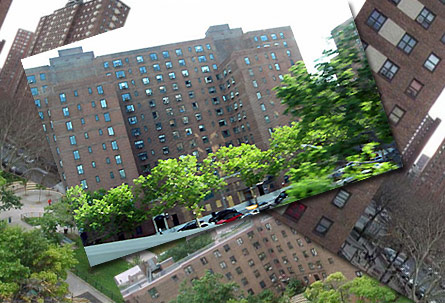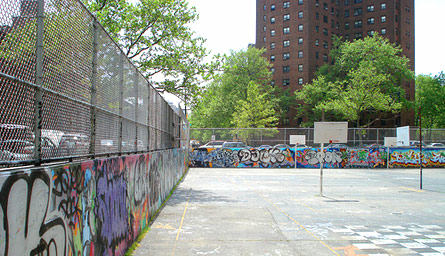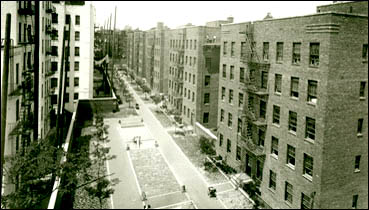
About 30 years ago, living in a city housing project had its advantages.
“ I remember when I was in middle school and elementary school everyone wanted to come to my house to do homework or come and play,” City Council Member Rosie Mendez, chair of the council’s Subcommittee on Public Housing recalled recently. “People in tenements had worse conditions.”
Now, though, the tables have turned. Declining government subsidies along with soaring operating costs have put New York’s massive public housing projects into what Daily News columnist Errol Louis has characterized as a “civic emergency.” Today, residents complain about the elevators being “out of service,” garbage going uncollected and broken intercoms. In many of the projects, conditions may be worse than those in comparable private housing.
Governor Eliot Spitzer’s signing of a bill last week that would allow the housing authority to collect higher rent from people on public assistance who live in the projects is a step in the right direction, advocates said. But experts on public housing add that much more remains to be done.
Some have suggested that, like other cities, New York City should consider demolishing or privatizing its public housing. Others counter that that would only make the city’s affordable housing crisis worse and force thousands of lower income New Yorkers out of the city. Instead, they say, the city, state and federal governments must all fund public housing adequately so it remains a good place for working New Yorkers to live and raise their families.
“ Preserving this housing is so fundamental to making our city work and ensuring that so many people can continue to live and work here,” said State Assemblyman Brian Kavanagh. “We’re not on the brink of bankruptcy – we don’t want to alarm people unduly. But at the same time it’s a long-term problem that needs long term solutions.”
HUNDREDS OF THOUSANDS OF HOMES
|
The New York City Housing Authority provides homes in public housing to over 400,000 New Yorkers and, through the nation’s largest Section 8 rent subsidy program, helps another 255,000 afford their housing in privately owned houses and apartments.
“ It’s the best source of housing for truly low-income people,” said Judith Goldiner of the Legal Aid Society, who has worked on legal issues related to public housing for over 15 years. “I know that if I can get my client into NYCHA, they’re pretty much set. They’ll have a decent place to live. Compared to everything else, it’s much, much better than anything else out there.”
Simply put, public housing makes living in New York possible for thousands of low-income families. The average family income in public housing is about $20,000 annually and the average rent is $320.
New York was the first American city to build public housing, 73 years ago. The federally funded projects were built first on the Lower East Side, replacing notoriously ill-lit and poorly maintained tenement buildings. Today, public housing’s 343 developments include almost 2,700 buildings. The waiting list to get in is long, with over 130,000 people.
The projects are located throughout New York City. Public housing has preserved economic diversity in many parts of the city where skyrocketing rents have forced low-income people out. Without the projects, neighborhoods like Chelsea would be more homogenous, at least economically: High income people surrounded by Whole Foods, Starbucks and other shops that cater to them.
Public housing contributes to the social and cultural fabric of the city in many ways. In the Highbridge section of the Bronx, for example, Highbridge Houses holds an annual community fair that attracts hundreds of people from throughout the community. Other projects present similar events. Beyond providing shelter, the public housing projects operate senior centers, community centers and youth programs. Public housing “is the foundation of many neighborhoods,” said the housing authority’s spokesperson, Howard Marder.
THE DEVELOPING SHORTFALL
Most of the projects were built with federal money, 15 were constructed by the state and six by the city. The housing authority manages the whole system with about 13,000 full-time employees and a total budget of $3.4 billion. Of that, about $2.7 billion pays employee salaries and building maintenance. About $700 million goes for capital expenses, such as major renovation work on the buildings.
Rent payments bring in about $700 million annually. Up until the 1960s rent covered the building’s operating costs. But that began to change when it became obvious that rents collected would not suffice to maintain and run the buildings.
Since the 1980s, significant cuts to the federal housing budget have caused problems for public housing in the city. Analysts estimate that the city government now receives only 83 cents for every dollar it needs to operate its federally financed buildings. To make matters worse, in 1998, then Governor George Pataki eliminated the state’s operating subsidies – about $65 million -- for its 15 buildings. And in the wake of 9/11, Mayor Michael Bloomberg did away with the city’s contributions to its five developments, about $25 million.
“ Over the past decade, funds have been drying up from every source,” said Victor Bach, a housing policy expert at the Community Service Society. “Washington has cut funding … and the city and state have turned their backs on NYCHA. The operating deficits accumulate and add up and at some point you can’t continue them. And I think NYCHA has reached that point.”
All the cuts – and significant increases in the costs of operating the public housing system – have led to the current crisis, which is growing more severe each year. The mayor and the City Council responded in 2006, appropriating $120 million for the housing authority’s fiscal year 2007 budget, up from nothing the previous year. “The city has stepped up,” the mayor’s office said in a written comment, adding that, beyond the $120 million, it provided $50 million in operating dollars along with $100 million in capital monies for the next four years. And this year, the state will provide $3.4 million. But, despite this infusion, NYCHA is facing a shortfall next year of about $225 million, almost a third higher than last year’s $168 million deficit.
CALLS FOR CHANGE
The authority’s fiscal crisis has sparked anger among its tenants and others. At a public hearing in late July, about 300 public housing residents sharply criticized the board and the authority’s general manager, Doug Apple. The residents had long lists of complaints, from police harassment to broken locks on the doors to their buildings. One speaker called for Apple to resign.
Later Apple was diplomatic about the harsh criticism. “It comes with the territory,” he said. “Residents feel strongly about public housing and they have a right to criticize.”
On a more positive note, residents, advocates and elected representatives have come together to fight for more funding for the housing authority. Councilmember Mendez called on her City Hall colleagues to act a press conference in July, and State Assemblymember Kavanaugh rallied state legislators in early August in support of the housing authority.
The spectacle of public housing residents and their supporters joining with the authority is somewhat unusual. “NYCHA doesn’t have a good reputation because it’s a big bureaucratic organization and they don’t respond” to even simple requests, Goldiner said. “They’re pretty arrogant and they’re not very responsive and people don’t like it. Who wants to help them? But “this housing is too important and the money issues are too important,” she said.
Chloe Tribich of Housing Here and Now, which has worked on housing issues citywide, agreed. “NYCHA’s such a huge source of affordable housing,” Tribich said. “If you lose that, it’ll be very different.
“ It’s hard enough for people to find affordable housing now,” she continued. “A lack of funding for NYCHA means there’ll be more competition for other affordable housing. It would just add to the number of people who are seeking low-rent apartments.”
LOOKING FOR SOLUTIONS
A Search for Funds
The authority has sought ways to make up the financial shortfall. Since 2003, the authority has reduced spending by half a billion dollars. Last year, it released a Plan to Preserve Public Housing. Among other things, it called for rent increases and sought relief from Washington. It has also imposed much higher fees for replacing doors, faucets and even light bulbs.
This year, it has proposed using 8,400 Section 8 vouchers, normally used to help low-income people pay rent on privately owned apartments, to pay rent on apartments in the 21 non-federally funded buildings – the buildings built by the state and city. That proposal was widely criticized by advocates who said it would effectively rob Peter to pay Paul; it would reduce the number of rent-subsidy vouchers available to low-income families who qualify for housing help but who, because of a shortage of apartments, cannot find room in public housing.

Service Cuts
The authority has also proposed cutting its staff by another 500 people -- on top of 1,600 layoffs since 2003, Errol Louis reported in the Daily News.
The tenants see the effects of the cuts. Rosia Wyche, who has lived in the Coney Island Houses for 31 years, says she has seen the deterioration since the authority reorganized the management of her building and reduced trash service. “It’s not as neat as it was, it’s not as clean as it was. People are beginning to complain about mice,” Wyche, chair of the housing authority’s Citywide Council of Presidents district for southern Brooklyn, said. “We never had mice. In all the years I lived here I’ve never heard talk of mice before, until lately.”
On a visit to several projects, Louis said he saw many signs of the tough times for public housing: “A damaged, blackened hallway marked the still-unrepaired site of a fire back in June ….The woman in Brooklyn's Gravesend Houses whose damaged, leaky apartment grows mold that triggers her daughter's asthma. The piles of uncollected garbage in front of the Drew-Hamilton Houses in central Harlem.”Overall, Louis has written, “The cuts are causing a sharp decline in basic services. Intercom inspections will be replaced with â€service on demand,’ and $406 million in security contracts are being terminated - moves that will thrill criminals….Repairs of leaky roofs and the authority's ever-failing 3,334 elevators will take even longer.”
“ Our goal is to maintain every single public housing unit,” Apple said. But “if we don’t get increased funding, it becomes very challenging. Every city in the country has eliminated or demolished public housing. We’re not going to do that.”
In other efforts to generate funds, the authority has struck a deal with the city to develop affordable housing on some vacant land that will bring in about $50 million. The new homes would be part of the mayor’s $7.5 billion plan to build 165,000 apartments by 2010. And, with the federal government’s approval, the authority is using $100 million meant for capital spending as operating money.
Legislative Remedies
Residents, advocates and elected representatives are pushing for other policy changes beyond the housing authority’s immediate control. At rallies, they urged the governor to sign the bill to allow the housing authority to collect the same shelter allowances from recipients on public assistance as private landlords do. By agreeing to that and signing the bill, Spitzer effectively added almost $100 million to housing authority’s budget over the next three years.
U.S. Representative Nydia Velazquez and Senator Charles Schumer have introduced legislation in Congress that would have the federal government pay the operating subsidies for the state- and city-financed housing projects. That could bring in $100 million annually. A spokesperson for Velazquez said 10 of the city’s 12 congressional representatives support the legislation, and it will be “moved on” in the next congressional session.
Unlike other non-profit housing providers, advocates point out, the housing authority pays the city $23 million in lieu of taxes. These fees should be eliminated, they said, as should the $73 million the city charges the authority for special police services.
Advocates question the effectiveness of those police services, too. Councilmember Letitia James of Brooklyn is leading an effort to sue the police department for the discriminatory way it polices the projects, she said. (See sidebar.)

Before: A view of the backyard at First Houses prior to the construction.

After: The back of First Houses as workers put on the finishing touches.
Going Private
The authority’s proposed sale of vacant land to the city is the closest it has come to privatization. Other cities have gone much further, demolishing public housing buildings and auctioning properties. It is the most realistic solution, asserted Julia Vitullo-Martin, a housing policy expert at the Manhattan Institute.
“ What an ordinary property owner with NYCHA’s assets and that kind of deficit would do is obvious,” Vitullo-Martin said. “An ordinary property owner would look at what assets are very valuable but are a drain but could nonetheless be sold for substantial profit.”
The simple reality is that public housing has lost public support, Vitullo-Martin said. “Political support for public housing all across the country has evaporated and is not coming back in the near term. Even with a Democratic landslide, support for public housing is not coming back. NYCHA has to do what other systems did: Rethink what it’s doing with its assets.”
But most city officials and politicians reject “semi-privatizing” NYCHA, as Vitullo-Martin calls it. They say it would only make the city’s affordable housing crisis more acute. “Public housing is not being privatized,” the mayor’s office said in its written comments. “We intend for it to remain in good condition for current and future generations of New Yorkers.”
Bach considers any privatization a last resort, albeit one that might please some developers. The authority could “take parts of the inventory that are most marketable and sell them off so that the operating load is lessened,” said Bach. “I think (developers) are prepared to move in just as they were prepared to move in on Starrett City and Stuyvesant Town.” Other cities have taken that path, demolishing public housing buildings and auctioning properties, but this plan is the closest the authority has come to privatizing..
For now, the authority’s main hope is government. If the city, state or the federal governments do not come through with adequate funding, residents will see reduced services at the very least. The authority might shut down senior centers and end community programs, for example.
Still, authority officials express optimism. “NYCHA has been here for 73 years,” Marder said. “It plays a vital role. And it’s going to continue to do so. The question is at what level of services.”
Joe Lamport is the assistant director of the City-Wide Task Force on Housing Court, a coalition of community housing organizations. Â




